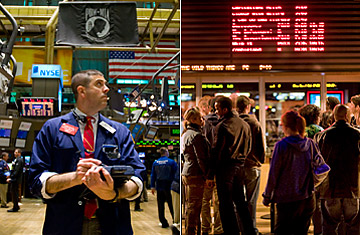
(2 of 2)
At least one studio, Lionsgate, made that argument in a letter to Congress supporting the movie derivatives initiative. "We believe a market in domestic box office receipts would substantially widen the number and breadth of financing sources available to the motion picture industry by lowering the risk inherent in such financing," said Michael Burns, vice-chairman of Lionsgate. "We are excited by the prospect."
What most riles the plans' creators is the tactics of the opposition, specifically the MPAA's late arrival into the fight. "It was definitely out of left field," says Swagger. "The MPAA submitted their letter on March 23, which was the day before we were supposed to receive our regulatory approval and five months after the public comment period [had ended]." He accuses the group of wanting to twist the plan into a political issue.
"Congress didn't carve out credit default swaps," says Jaycobs. "It only carved out movie box office futures — that's the absurdity of it! ... What kind of special interest [group] has the ability to insert language like that?" The House held hearings on the matter, but did not prohibit movie futures in its version of the bill.
During the House hearing, the MPAA's Pisano warned that if a movie producer, actor or other person affiliated with a film decides to short the film as a hedge, they'd run the risk of creating bad publicity by appearing to be "betting against" the success of their own movie. He also cautioned that if futures contracts sold poorly or prices were low, it could send a message to the general public that the industry thinks the movie will bomb and effectively turn the speculation into a self-fulfilling prophesy.
Then there's the insider trading risk, where insiders could use information or even manipulation to affect the box office numbers to ensure a big payoff in the futures market. For example, a distributor could cut back on the number of theaters that show the film or slash marketing dollars, which could both impact ticket sales, says Pisano.
Doug Creutz, a senior analyst at Cowen & Co., calls movie futures a "terrible idea." "These instruments serve no purpose other than to essentially legalize gambling on film performance. If you want to gamble, go to Vegas," says Creutz. "What is the difference between this and betting on the point spread on the Lakers' game tonight? There is no difference."
But advocates dismiss the criticism as scare-mongering. They point out that futures contracts were not the culprits that gave Wall Street a black eye and that investment in movies is always a gamble. "The gamble was taken by a group who made the movie in the first place — the futures market simply spreads that risk," says Swagger.
Jaycobs says he isn't surprised by the opposition, noting that other industries, such as oil, also protested when futures were first introduced in their sectors. "If we go back to the early '80s, the seven sisters were opposed to the idea of creating the NYMEX futures market," he said. "But now they're all major participants in that market, they learned how to use it to their benefit and it's a very robust public market."
So how does this movie end? Nothing will be known until a financial reform bill is signed by President Obama, though the current thinking is that the Senate will be reluctant to remove the movie futures ban simply because any small language change in the bill could beget debate which in turn could beget more changes to other parts of the legislation.
